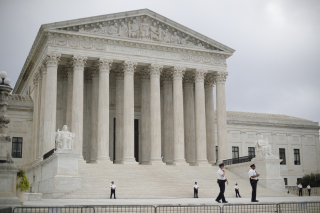As the Supreme Court wraps up its annual flurry of blockbuster rulings, it’s easy to focus on the winners—the parties who prevailed, the doctrines that triumphed, the justices whose views carried the day. But the end of the term is also a good time to remember that in the long arc of constitutional history, some of the most important victors began as losers.
No one embodies that better than Myra Bradwell.
In 1873, Bradwell—a brilliant legal mind, newspaper founder, and civil rights reformer—was denied the right to practice law by the Supreme Court. In an 8–1 decision, the Court declared that women were unsuited to the intensity of the legal profession. Her “paramount destiny,” they said, was to fulfill the “benign offices of wife and mother.”
She lost her legal case arguing that she enjoyed a right to earn a living. But through freedom of speech, she won something bigger.
Bradwell went on to start the most influential legal newspaper in the country, the Chicago Legal News. She helped draft and pass laws expanding women’s economic and legal rights. And she even used her platform to secure the release of Mary Todd Lincoln from a mental institution, after the former First Lady had been committed by her own son in a rushed and questionably legal proceeding.
Bradwell’s case—Bradwell v. Illinois—is still taught in law schools today, usually as a cautionary tale of 19th-century sexism. But it’s more than that. It’s also a lesson in how free speech can be a lifeline when other rights are denied—and how civil rights progress often starts and even ends outside the courtroom.
Ironically, Bradwell effectively became a lawyer through her printing business. She drafted and sold legal forms like leases, wills, and bankruptcy petitions. She also summarized statutes and recent legal decisions, which was vital to practicing attorneys and gave her the income necessary to survive.
After being told she could not represent specific clients in the court of law, Bradwell also turned toward the court of public opinion. Her paper campaigned for reform, skewered bad judicial opinions, and lobbied for equal rights.
Many of these critiques were as witty as insightful. She wrote that “woman has the right to think and act as an individual… if the great Father had intended it [] otherwise, he would have placed Eve in a cage and given Adam the key.” When judges justified excluding women from various professions based on the “immemorial” customs in England, Myra wrote that, if true, then “every attorney who appears in the Supreme Court of the U.S.” should “wear a gown and wig.”
In addition to securing laws that opened up various professions to women and passing reforms that cleaned up cronyism in the legal profession, one of Bradwell’s greatest victories was securing the release of Mary Todd Lincoln from a mental institution. When Lincoln was institutionalized after a short, one-sided hearing, Bradwell launched a media campaign that helped free her.
Ministers preached about the injustice, papers published exposés, and public outrage grew so strong that Mary was released just months later. Mary would later give the Bradwells Abraham Lincoln’s the pen he used to sign the Emancipation Proclamation as a token of gratitude.
Bradwell’s story also spotlights a tension that still haunts constitutional law: the artificial divide between favored, so-called fundamental rights like free speech and non-fundamental rights like the freedom to work or earn a living.
Courts today apply strict scrutiny to laws that burden speech, taking a close look to make sure the legislature had a good reason for acting. But if a law makes it impossible to start a business, pursue a trade, or enter a profession? Judges typically wave it through with little more than a shrug.
Myra Bradwell’s life makes clear that this line is often impossible to draw. Speech was how she earned a living. Work was how she exercised her voice.
The two were inseparable, because speech is often a prerequisite to other rights. Throughout history, when people have been deprived of constitutional rights or equality under the law, free speech has been their means of conquering law itself and reclaiming those rights.
Bradwell may not have changed the Court’s mind in 1873, but she changed the world around it. And in 1890, Illinois finally admitted her to the bar—retroactively effective to the date she first applied. Two years later, the Supreme Court did the same. By then, she no longer needed the title. She had shown that law wasn’t just practiced in courtrooms.
As the Term ends and the Court’s winners and losers are tallied, Myra Bradwell reminds us of a deeper truth: the Court doesn’t have the final say on justice. Sometimes its losers become the legal history’s greatest champions.
Read Full Article »




